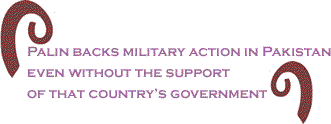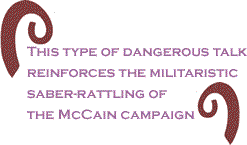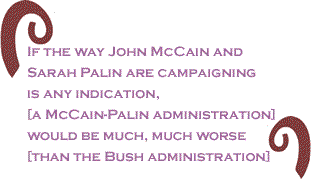
|
|||||||||||||||||||||||

|
|

Custom Search
|
|
 |
|
It’s not clear whether or how long
the Republicans can maintain this pretense. Stretching this stage-managed
ABC-TV “interview” over four episodes will not hide the fact that
the Republican Vice-Presidential candidate is best kept away from
microphones and tough questions about government policy. Still,
one never knows – the way the major “Sarah Palin shows hawkish streak in first interview,” ran the headline in the British newspaper The Guardian. Palin didn’t just threaten
The consequence of Governor Palin’s woeful lack of knowledge and experience is that her pronouncements are not nuanced as Senator McCain’s but they do represent the tenor of the ticket. As a clearer picture emerges of what the foreign policies of a McCain-Palin Administration would look like, it has prompted nervousness and concern elsewhere on the planet. One of the reasons for Obama’s popular support over much of the rest of world is that the substance of the McCain-Palin campaign is scaring the bejesus of out of people. Much has been made of Palin’s apparent lack of knowledge
about the “Bush Doctrine,” but that might not carry the weight with
the public some observers think it might. Most people don’t actually
know what the term means and pliant Big Media can hardly be said
to have spelled it out clearly when it mattered, before the invasion
of After she arrived in
“And we've got to keep an eye on Palin was evidently unmoved by the ridicule already
visited on the notion that she somehow knows how to deal with About Palin’s discussion of going to war, the British commentator Goldenberg noted that “there is a nominee for the vice presidency of the United States who may one day have her hand on the button and she is casually talking about potential catastrophic nuclear war.” “Saber rattling matters,” wrote Goldenberg. “Words
matter. We've learned that from the past eight years. When George
Bush said ‘With us or against us,’ it mattered. When he referred
to a ‘crusade’ it mattered. When McCain jokes about war with
“And when Sarah Palin, a first term governor with no national security experience or expertise, talks about hypothetical nuclear war it really matters. It reflects badly on her and her readiness. It reflects even worse on John McCain who thought that she was qualified to be Commander in Chief.” Qualification aside, what has many observers outside
the Referring to “the muck being hurled by the McCain campaign is preventing a debate on real issues - on whether the country really wants, for example, to continue the economic policies of the last eight years,” wrote New York Times columnist Paul Krugman last week. He went on to suggest “the Obama campaign is wrong to suggest that a McCain-Palin administration would just be a continuation of Bush-Cheney. If the way John McCain and Sarah Palin are campaigning is any indication, it would be much, much worse.” It sounds like a lot of people abroad are concluding this might also be true in the area of foreign affairs. “Americans have been warned,” wrote Jacob Heilbrunn
on the Huffington Post the day the Palin interview aired.
The BlackCommentator.com Editorial Board member Carl Bloice is a writer in |
|
Any BlackCommentator.com article may be re-printed so long as it is re-printed in its entirety and full credit given to the author and www.BlackCommentator.com. If the re-print is on the Internet we additionally request a link back to the original piece on our Website. Your comments are always welcome. eMail re-print notice
If you send us an eMail message we may publish all or part of it, unless you tell us it is not for publication. You may also request that we withhold your name. Thank you very much for your readership. |
|
| |
|
| September 18, 2008 Issue 291 |
|
| Executive Editor: Bill Fletcher, Jr. |
| Managing Editor: Nancy Littlefield |
| Publisher: Peter Gamble |
| Est. April 5, 2002 |
Printer Friendly Version
in resizeable plain
text format or pdf
format. |
| Frequently Asked Questions |
 |

|
 |
 |
 |
| |
| |




























 Palin
spoke strongly in favor of talking
Palin
spoke strongly in favor of talking 
 If
any more indication were needed that the neo-conservative hawks
have embraced the Republican Presidential ticket, one only had to
watch the neocons go into rapture after Palin’s nomination. They
have not been happy campers in the post-Cold War world. The “war
on terror” is a bit nebulous and its execution can cause the kind
of conflict the chieftains of the oil industry don’t want to have
with the autocratic governments of the
If
any more indication were needed that the neo-conservative hawks
have embraced the Republican Presidential ticket, one only had to
watch the neocons go into rapture after Palin’s nomination. They
have not been happy campers in the post-Cold War world. The “war
on terror” is a bit nebulous and its execution can cause the kind
of conflict the chieftains of the oil industry don’t want to have
with the autocratic governments of the 






